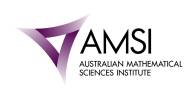2014: Introduction to
Pure and Applied Experimental Mathematics
 AMSI Honours Course
AMSI Honours Course 
Experimental Mathematics is the use of a computer to run computations - sometimes no more than trial-and-error tests - to look for patterns,
to identify particular numbers and sequences, to gather evidence in support of specific mathematical assertions, assertions that may themselves arise
by computational means, including search. Like contemporary chemists - and before them the alchemists of old - who mix various substances together in a
crucible and heat them to a high temperature to see what would happen, today's experimental mathematician puts a hopefully potent mix of numbers, formulas,
and algorithms into a computer in the hope that something of interest emerges.
This course will provide a rigorous introduction to Experimental Mathematics while also exploring a variety of pure and applied mathematical topics
that the student may well not have seen during an undergraduate degree.
Course Goals The successful student will emerge from this course with much enhanced abilities to:
- Use current mathematical computation tools
- Learn mathematics independently
- Formulate and refine conjectures
- Develop strategies for proof or refutation of new mathematics
- Place and Time V206 from 10.00am-12.00pm on Tuesdays starting on July 28th with a backup
time of 10.00-12.00 Thursday. The class will have access to a Dropbox
for shared material. Please email me at jon.borwein at gmail.com to be invited to the drop box.
- Text J.M. Borwein and D.H. Bailey, Mathematics by Experiment: Plausible Reasoning in the 21st Century, Expanded 2nd edition, AK Peters, 2008.
(PDF versions of this and related texts are available in the course dropbox).
- Assessment There will be three graded assignments each counting for 33.333...% of the final mark.
In each case you will be asked to select 10 exercises (with my approval) from
chapters in the Text and produce full answers in LaTeX, Maple documents, or similar form.
- Schedule The rough schedule for lectures and assignments is as follows:
- Week 2 Assignment 0 due (Available in PDF)
- Sept 27 Assignment 1 due (Chapters 1, 2 and 3)
- Oct 22 Assignment 2 due (Chapters 4 , 5 and 6)
- Nov 10 Assignment 3 due (Chapters 7)
The assignments should be emailed to me for privacy. Questions can be discussed with me by email at any time.
The due date is always midnight Friday.
A typical lecture will assume the student has read the the relevant material from the text.
Generally, I will discuss and amplify the salient points and then do related computations or answer questions.
We may also start a course wiki.
-
Resources and Links These will grow over time. The current links are largely to a previous version of this course. Maple worksheets need to be saved and then opened.
- Related papers, talks and links
|

